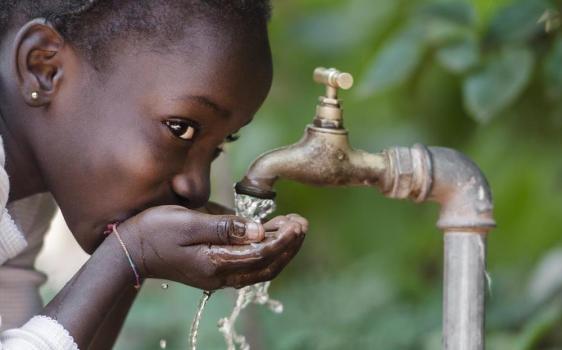This is the third in a series of blogs in which participants provide a recap of their Stockholm World Water Week event.
Safe water and sanitation are crucial for human health and economies. But how do we pay for these essential services and unlock new sources of funding? This question was at the forefront of topics at Stockholm World Water Week 2017, an annual gathering of more than 3,000 doers and thinkers in the water sector.
At Stockholm, USAID’s Water, Sanitation and Hygiene Finance (WASH-FIN) activity convened a session entitled: “Tapping Capital Markets to Finance WASH Investments.” A 2016 World Bank analysis estimates that $114 billion per year of investments will be required to meet universal access to safely managed water and sanitation services by 2030, or about three times current levels. Commercial finance can play a critical role in filling this enormous gap through investments in creditworthy water and sanitation providers to improve, maintain, or expand their services to reach more communities. As commercial finance increases, scarce public resources can be leveraged, and targeted to communities with the most challenging barriers to improved service delivery.
USAID’s Acting Global Water Coordinator and Deputy Assistant Administrator James Peters opened the session giving a brief overview of the history of WASH financing at USAID and its importance to the sector and then introduced the new USAID WASH-FIN activity. USAID’s Office of Water Deputy Director Jeff Goldberg then framed the session as a discussion of the related but distinct concepts of “creditworthy” water service providers (or utilities) and “bankable” projects in the WASH sector—two finance terms that come up in WASH circles, but often have unclear definitions. Expert panelists brought experience and practice from their unique perspectives of government/regulatory bodies, credit-rating agencies, and both public (World Bank) and private (commercial banking) finance institutions.
Creditworthiness: A Measure of Performance and Risk
WASH-FIN Chief of Party Sam Huston led the first panel with questions aimed at more clearly defining creditworthiness: namely 1) what aspects of creditworthiness are the most challenging to overcome, and 2) are official credit ratings required to access debt capital? He sought the perspective of Robert Gakubia, engineer and CEO of the Kenya Water Services Regulatory Board, and Eyal Shevel, public sector head of Global Credit Rating. Highlights from that panel discussion included:
-
Creditworthiness is a measure by which a utility can move from rhetoric about improving performance to concrete, evidence-based action.
-
Water utilities have many challenges to improve creditworthiness, with obtaining approval on inflation-adjusted, cost-reflective tariffs being foremost.
-
Tariff approvals can be impacted when short-term local political cycles run counter to the long-term investment needs of water utilities to expand and improve service for all.
-
Low willingness of utilities to repay debt is attributed to the sector’s lack of a culture of repayment— even in instances where there is ability to pay.
-
Independent credit ratings send signals to sources of capital—both quantitative and qualitative—covering financial, performance, management, and governance aspects.
-
Ratings help managers know the utility’s position relative to a creditworthiness standard, and helps them to move toward that standard.
-
Ratings can further serve to build and strengthen the discipline of the utility—including internal or shadow ratings that help utility managers gauge performance, but are not typically available to the public.
-
When water is marketed and sold “as a service” governed and monitored by an independent regulator this helps resolve the challenge of consumers’ willingness to pay approved tariffs—foundational to both creditworthiness and bankability.
Attracting Capital
This discussion set the stage for the second panel on bankable projects, moderated by WASH-FIN Senior Infrastructure Finance Advisor Jeremy Gorelick that brought the experience and perspective of three sources of finance into the discussion: André Kruger, a former commercial banker currently involved in WASH infrastructure investment in Africa, Robert Bunyi, CEO Kenya Pooled Water Fund, and Sophie Trémolet, senior economist at the World Bank Water Global Practice.
The panel covered concepts related to “bankability” of WASH projects, and how a utility can be rated “creditworthy” but not have a “bankable” project—one that on its own merits would pass muster in the due diligence process of a financial institution offering repayable finance. Mr. Kruger asserted that bankability (of projects) and creditworthiness (of utilities) are “100 percent” correlated.
Tapping Public and Private Funding
Finally, the panel was asked about distortions in these nascent markets, often caused by the public sector. Takeaways from that discussion included the following:
-
Development finance institutions have at times crowded out private (bank) finance with below-market rates.
-
Governments can also cause distortions if funding is channeled through multiple and overlapping jurisdictions and agencies without coordination.
-
Policy shifts that give space for and incentivize commercial finance hold promise to rationalize the sector to be more efficient and effective in the way capital is mobilized to meet growing investment needs.
-
Segmenting the market is a good idea, such that scarce public funds and foundation grants go to segments that are less commercially viable, and more viable segments are financed from commercial, local currency sources.
-
Credit enhancements, such as a USAID Development Credit Authority guarantee, can change the risk profile of an otherwise unbankable project such that it could be made bankable.
-
Public and private sources can be leveraged and blended to finance investments in both segments using more targeted performance-based grants and other tools. A new World Bank report entitled “Easing the Transition to Commercial Finance for Sustainable Water and Sanitation” expands on these points.
USAID’s WASH-FIN project is starting up activities in five countries to close financing gaps needed to achieve universal access to water and sanitation. Learn more about the project and updates here.
Stephen Sena is the deputy chief of party for WASH-FIN.


